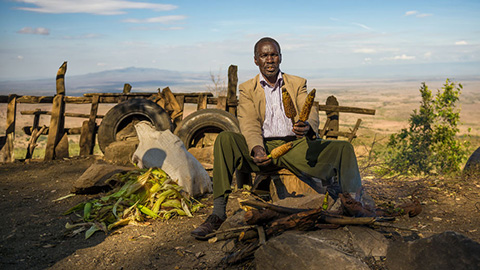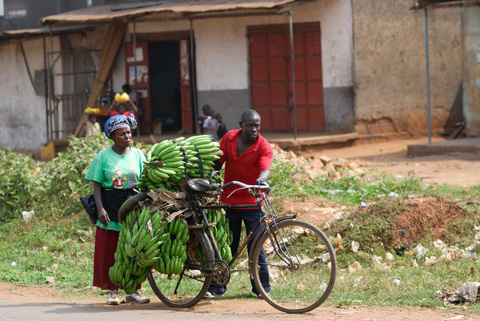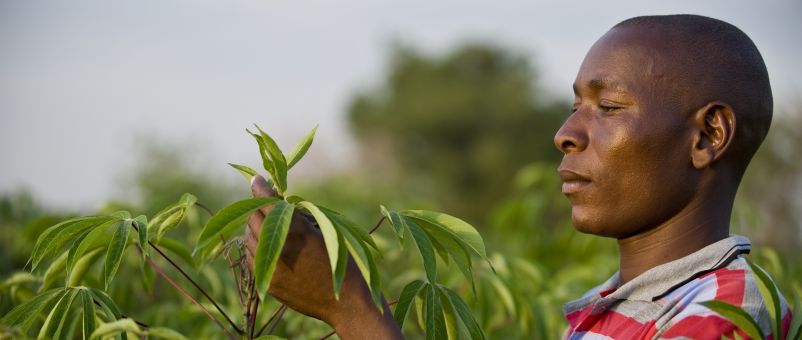- About
- Topics
- Picks
- Audio
- Story
- In-Depth
- Opinion
- News
- Donate
-
Signup for our newsletterOur Editors' Best Picks.Send
Read, Debate: Engage.
| April 07, 2015 | |
|---|---|
| topic: | Sustainable Agriculture |
| tags: | #added value, #Africa, #agricultur, #environment, #Farmer, #Kenya, #poverty, #smallscale farmers |
| located: | Kenya |
| by: | Bob Koigi |
Traditionally Kenyan farmers' obsession with certain crops has worked against them as evidenced in market oversupply. Farmers would produce the same crop at the same time, which would be harvested at the same time and taken to the same market, yielding low prices.
Suchhasbeenthecasewith the high yielding tissueculturebananafarmerswhohave traditionally countedlossesafterthemarketburstduetoan oversupply.The high banana variety may have returned impressive yields to those who invested in them earlier, but an obsession with the crop by half of Kenya’s 400,000 smallholder farmers ended up creating a glut on the market, leaving late entrants with bunches rotting in farms.
Vanguard farmers are now weathering the oversupply with value addition with end products like banana biscuits, beer and crisps earning more than triple the raw product.
Kiburi Food Processors in Central Kenya, for example, is now training banana farmers to dry the crop using low-cost solar dryers to preserve unsold bananas. The factory manager Mrs. Njoki Wainana said dried bananas are ideal for export to countries like China whose appetite for such bananas is unrivalled and yet to be tapped by Kenyan farmers.
While a single banana would yield a maximum of $0.05, a sachet of banana crisps made from one banana would go for as much as $0.20, with the crisps lasting for more than 3 months, unlike the banana which can’t last for more than two weeks.
Recently another farmers’ group still in Central Kenya made an even greater valueadditionbreakthrough when a banana wine they had been producing caught the interest of a South Sudan wine company which has now seen the farmers collectively raised over $330,000 to build a fully fledged banana wine making plant as a way of beating the biting glut. The venture is based on the traditional fermentation process, which involves using yeast to hasten fermentation. The ready wine is decanted into medium sized jugs and left to stand for a day in a cool place, before being bottled in 330ml and 500 ml glass bottles that are returnable to the group for subsequent bottling. A 330ml bottle of the wine goes for $1.50 in local bars while fetching $2 in big cities like Nairobi.
And on the Western side of Kenya, an overproduction of sweet potatoes by farmers, coupled with poor pay by the dairy sector in the area, have together spawned an innovation that has moved into swift take-off, in the form of portagurt - yoghurt made from a blend of milk and sweet potato.
Through a farmer exchange program, avalueadditionplan was conceived to create the new portagurt, and with help from youth from the local polytechnic, farmers made simple machinery and set up a factory.
The packaging is done in quantities to make the produce accessible to all consumers, with the cheapest portagurt selling at Sh$0.50 and the most expensive at $1.50.
Another promising group in Western Kenya tired of being exploited by middlemen in their supply of goat milk decided to try something better. The farmers would earn as little as $0.30 for a litre of the milk they supplied to milk vendors. This, even as the price of goat milk in stores continued to record high prices of up to $1.50 a litre due to its superior and medicinalvalue. Aware of the profit prospects, the farmer group pooled resources and started processing high quality yoghurt through a modest factory. In what started with teething problems in 2009 that threatened the viability of their commercial ventures, the agricultural SME has now become a valueaddition behemoth, supplying goat yoghurt to supermarkets in East Africa. A litre of the yoghurt goes for $2 with the group supplying over 3,000 litres a day as demand soars.
With new age farmers finding innovative ways to add value to their produce, the traditional belief that farming in Kenya and Africa is for the poor man is quickly being replaced by millionaire farmers. Kihiko Githanga, a tissue culture banana farmer making banana wine in collaboration with the South Sudan wine agency, said that he earns $6,000 monthly, a far cry from the $100 he earned when selling bananas to the local markets.
“It is an interesting time to be a smart farmer in Kenya. The appetite for value added products locally and the opening up of regional markets is working in our favour. The future of food security is value addition,” said Kihiko, an observation the Kenya’s Ministry of Agriculture agrees with. “We have rolled out various value addition ventures across all aspects of agriculture because we understand now, more than ever, in the wake of changing climate and growing population, that it is our sure bet to food security,” said Professor Joram Mwathini from the Ministry of Agriculture.
Photo: Miroslav Liska


By copying the embed code below, you agree to adhere to our republishing guidelines.
